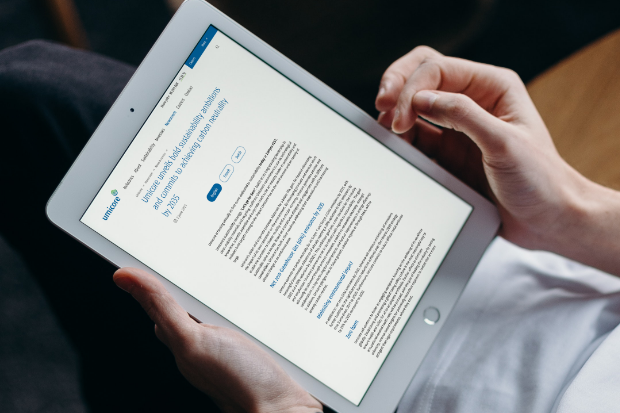Turning sustainability strategy into business policy
Umicore specialises in, among other things, recycling precious metals and producing rechargeable battery materials and emission control catalysts. The group understands its social responsibility and uses its technological know-how, scientific expertise and connections to help transform the sector.
In 2021, it created a comprehensive sustainability strategy. In this document, Umicore shows its aims to be climate neutral for scopes 1 and 2 (direct emissions as well as indirect emissions from electricity, heat and cooling) by 2035. The company is committed to a strong culture of safety and prevention in all its locations worldwide; it swears by inclusion and diversity as a breeding ground for innovation; and it wants to lead the industry by not passing up any opportunity. The company wanted to share these messages with its employees and the rest of the world, including customers, suppliers, partners, government and NGOs.
The strategy document was a hefty tome filled with sustainable development goals, dates and comments. But at its essence, it said: Umicore is looking beyond the impact of its business processes and is seeking to make a difference by developing products and services for clean mobility and the circular economy. Make Sense put its heads together and came up with an umbrella concept that would be starting point for the whole story: ‘Let’s go for zero.’
This idea is used as a basis for all of Umicore's sustainability communications – from press releases, sustainability pages and slide decks to videos, social media posts, and much more. When you say “sustainability at Umicore”, its employees, customers, suppliers and partners reply with: ‘Let’s go for zero!’
But how do you make sure your customers, suppliers and partners know what you are working on without getting bogged down in the detail or jargon? When Umicore finalised its sustainability strategy for 2025, it allowed the Make Sense team to strip it down to its essentials and translate it into a story that would be easy to tell. The result was a whole new business mantra: 'net-zero greenhouse gas emissions by 2035, zero harm, zero inequality and zero regrets'.
 |
 |
 |
